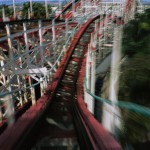Click, click, click, click, click. I stood in line for the roller coaster, hearing the steady beat of the large, oily chain that pulls the carts up the first hill of the track. As one cart slowly carried its excited riders to the apex, another cart zoomed around the sharp turns. As people flew down hills and around curves, I heard screams of thrill. I also carefully observed the vibrating beams and swaying poles of the ride. Of course, a coaster of such motions and speed must be designed to have “give.” The entire structure must be resilient – allowing for all the wild dynamics of the roller coaster experience.
As I waited beside the coaster for my own adventure – watching all these movements – I began to think of the extensive planning and calculation required to build such an edifice. No doubt, engineers work with necessary precision, being careful to employ the timeless truths of mathematics and physics. In fact, a visit to a website, library.thinkquest.org, highlighted what I had been pondering:
-
Complicated engineering goes into construction of a modern roller coaster. A single coaster may cause its engineers and designers to produce thousands of layouts, plans and blueprints. Then, scale models are built from materials such as wood and Styrofoam. Designers must check and re-check the forces that are exerted on the cars, tracks, and most importantly, the passengers.
What amazes me about the whole concept of roller coasters is our willingness to ride them. Despite the screams of the people, the shaking of the beams, the swaying of the cables, the velocity of the carts, the steepness of the hills, the fallibility of human operators, the decay of metal and wood, or the room for human error in design and maintenance; we still wait in line for the thrill of the coaster! (Well, at least many of us do!)
For years and years we have trusted the mechanics of these monstrous structures. We place our well-being and our lives on the line each time we ride. We trust the designers and maintainers of the coasters. We believe they know what they are doing and do it well.
How much more should we trust the One who designed and maintains the world! Yes, there are times I step back and observe the swaying beams of life. I watch important parts of my world seem to shake. Oh, but these things are only part of the “give” God has built in for a universe tainted by sinfulness. The swaying is proof that He built our lives to last; God can handle our travels through the complicated “ups and downs” and “twists and turns” of life.
Do you hear the “click, click, click” of the old and oily chain about to pull you up a steep hill? Is the wind blowing through your hair as you descend at a speed that makes your stomach tingle? Do the sharp turns give the sensation you might careen off the track? It’s okay. Our sovereign God is the Ultimate Mind. He knows exactly how to build everything – and just as perfectly manage it. The world He created and your life that He so carefully designed have always been in His able hands.
We trust human ingenuity and mortal constancy every time we ride a roller coaster, automobile, or even an elevator. How much more should we trust divine design and God’s faithfulness as we ride through life?
Thus says God, the LORD, who created the heavens and stretched them out, who spread out the earth and what comes from it, who gives breath to the people on it and spirit to those who walk in it: “I am the LORD; I have called you in righteousness: I will take you by the hand and keep you . . .” (Isaiah 42:5-6a, ESV)
For by him all things were created, . . . and in him all things hold together. (Colossians 1:16a-17b, ESV)

